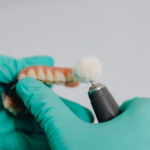Sensitive teeth can be a real pain, both literally and figuratively. If you’re tired of wincing every time you enjoy a cold drink or a hot meal, there are steps you can take to soothe your sensitive teeth and prevent future discomfort.
Understanding Sensitive Teeth
Sensitive teeth occur when the enamel, the protective outer layer of your teeth, wears away, exposing the underlying dentin. Dentin contains tiny tubules that lead to the nerves in your teeth, making them more susceptible to pain.
Common Causes of Sensitive Teeth
- Tooth erosion: This can be caused by acid reflux, bulimia, or excessive consumption of acidic foods and drinks.
- Gum recession: As your gums recede, the roots of your teeth become exposed, making them more sensitive.
- Cracked or chipped teeth: These can expose the sensitive dentin.
- Teeth grinding (bruxism): This can wear down the enamel and cause sensitivity.
Tips for Caring for Sensitive Teeth
- Use a toothpaste designed for sensitive teeth: These toothpastes contain ingredients that help block the tubules in the dentin and reduce sensitivity.
- Avoid acidic foods and drinks: Citrus fruits, sodas, and wine can contribute to tooth erosion. If you do consume acidic foods or drinks, rinse your mouth with water afterward.
- Limit your sugar intake: Sugar can contribute to tooth decay, which can lead to sensitivity.
- Brush your teeth gently: Brushing too hard can damage your gums and contribute to sensitivity.
- Use a soft-bristled toothbrush: A soft-bristled toothbrush is less likely to irritate your gums.
- Floss daily: Flossing helps remove food particles and plaque that can contribute to tooth sensitivity.
- See your dentist regularly: Regular dental checkups can help identify and address the underlying causes of sensitive teeth.
Professional Treatments for Sensitive Teeth
If home remedies don’t provide relief, your dentist may recommend professional treatments, such as:
- Desensitizing treatments: These treatments involve applying a special substance to the sensitive areas of your teeth to block the tubules in the dentin.
- Dental bonding: This procedure can be used to repair cracked or chipped teeth and reduce sensitivity.
- Root canal therapy: If the sensitivity is caused by a nerve infection, a root canal may be necessary.
By following these tips and seeking professional help when needed, you can effectively manage sensitive teeth and enjoy a pain-free smile.








